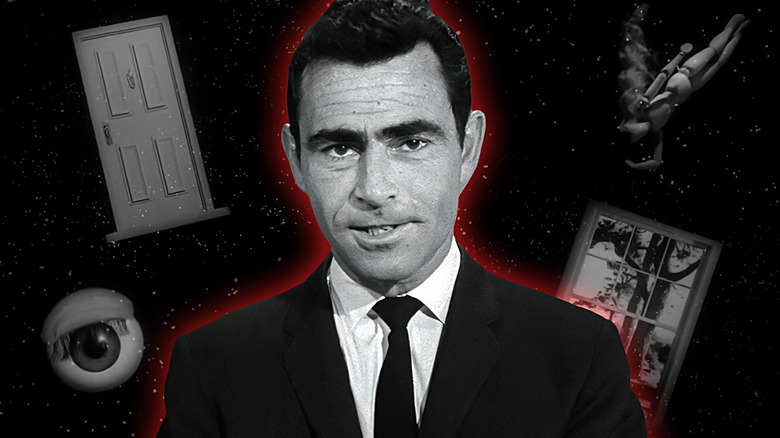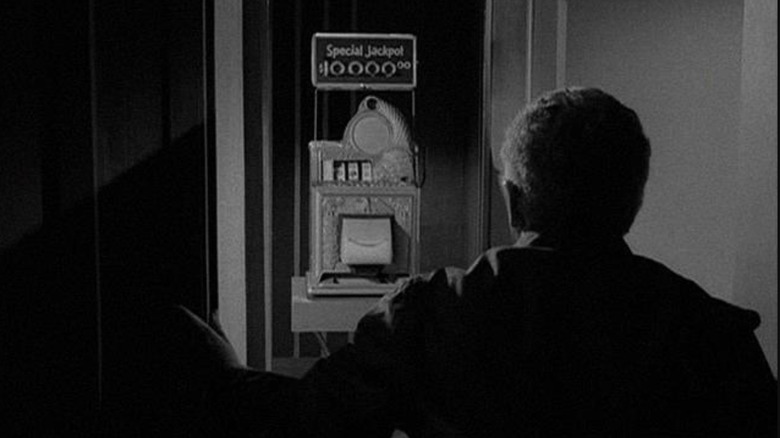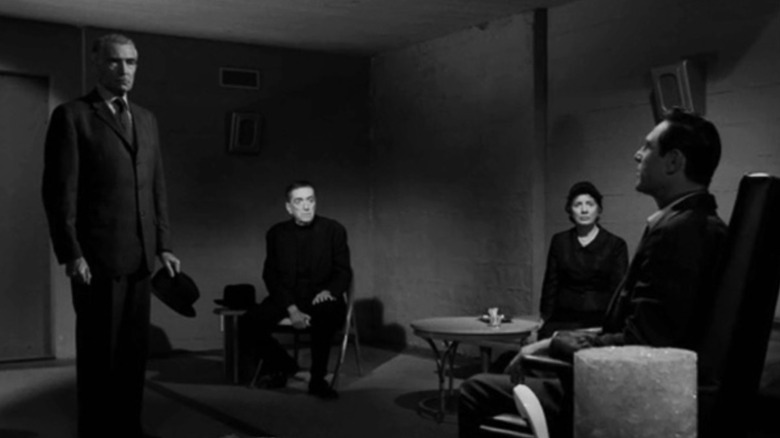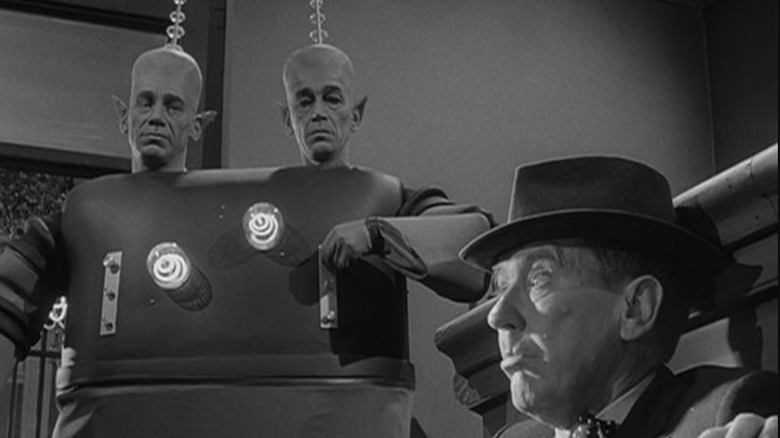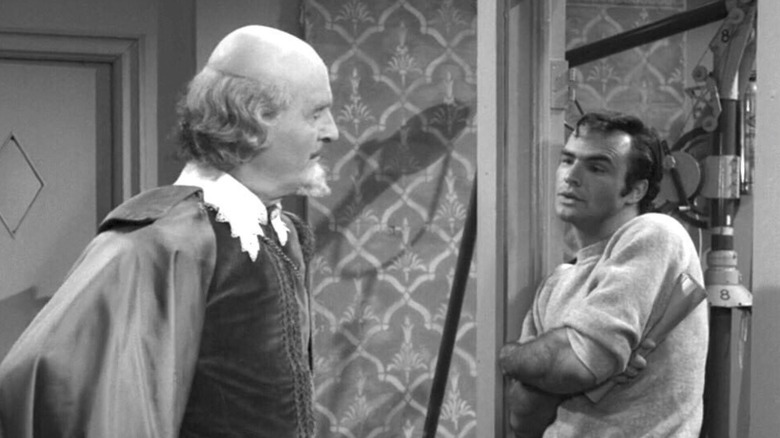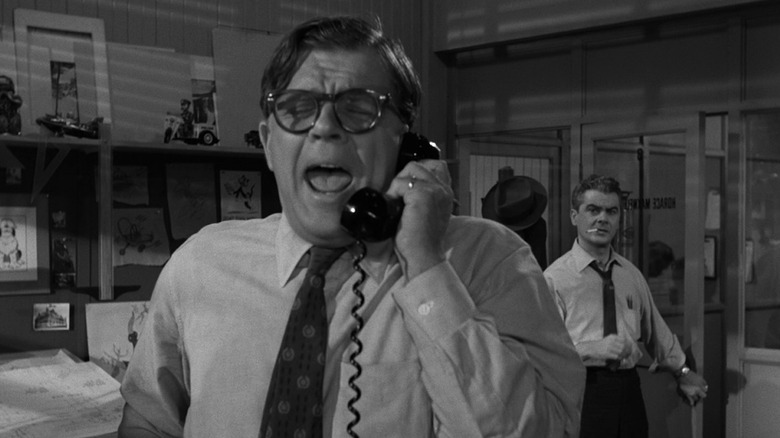The 5 Worst Episodes Of The Twilight Zone, Ranked
The original "The Twilight Zone," created by Rod Serling and broadcast on CBS from 1959-1964, is quite simply one of the greatest television series in the history of the medium. It has been incredibly influential in so many areas, from television itself (providing a sterling template for the anthology series), to sci-fi and horror in general, to even popularizing its title into a catch-all slang term for the strange and unusual. Serling not only gathered the cream of the crop of then-up-and-coming genre writers, but he also put his own imitable talents to use, writing the bulk of the series' 156 episodes and establishing the entire series' tone and style.
While the anthology, one-story-per-episode structure of "The Twilight Zone" allowed the series to avoid many of the usual pitfalls of long-running lightly- or heavily-serialized shows, it doesn't mean that the show was at the top of its game for its entire run. The series was beholden to some unavoidable aspects of television production such as censorship, sudden tragedy (with one episode suffering from the unexpected loss of its star), and plain old creative fatigue. Make no mistake: the majority of episodes of "The Twilight Zone" contain some of the finest examples of television the medium has ever produced. Yet not every episode can be a winner, and a notable few are downright stinkers. Here, then, are the five worst episodes of the series, ranked in order from being just a letdown to being so odious that spending an hour in the actual Twilight Zone would be preferable to watching it.
5. The Fever (season 1, episode 17)
One of Serling's chief aims in making "The Twilight Zone" was to employ a technique we're all very used to seeing in today's genre films and television: exploring serious and uncomfortable real-life topics through a sci-fi and horror lens. Rather than merely making an episode about a man suffering from a gambling addiction, which would require a level of internalized drama that a 25-minute episode of TV would find hard to reach, Serling wrote a script that externalizes the man's conflict in the form of a seemingly sentient (and evil) slot machine. Directed by Robert Florey, "The Fever" attempts to make the plight of Franklin Gibbs (Everett Sloane) a harrowing and terrifying one, as he's seduced into gambling by the evil machine, and, eventually, killed by it.
"The Twilight Zone" typically does very well with inanimate objects coming to menacing life elsewhere — there are several excellent episodes of the show dealing with killer dolls, mannequins, or dummies, for instance. Sadly, "The Fever" simply cannot make a slot machine a creepy antagonist, no matter how much shadowy lighting or faux smiles Florey throws onto the bulky, awkward metal bucket of coins. There's nothing inherently "wrong" with the show; it's just that it doesn't quite live up to its intentions. Thus, think of this entry as a stand-in for whichever "Zone" you understand intellectually, and perhaps even admire its aims, but feel that it just happens to miss the mark.
4. One More Pallbearer (season 3, episode 17)
Concurrent with Serling's desire to explore serious themes through a genre lens is his attempt to use "The Twilight Zone" to comment on then-topical political and social issues that network television would otherwise never allow a broadcast to touch upon. Although Serling received a robust education at places like Antioch College, he came from a fairly humble upbringing in Syracuse, New York, and that background gave his work an impassioned "voice of the common man" ring to it. In most cases, this down-to-earth aspect gave some of the kookier ideas presented in "The Twilight Zone" a good amount of credibility. It also allowed for Serling's thinly-veiled social commentary to resonate that much harder when it was firing on all cylinders.
However, sometimes it wasn't firing on all cylinders, as seen in "One More Pallbearer," directed by Lamont Johnson. The episode suffers from a hoary heavy-handedness, a trap Serling could fall into now and again. It isn't helped by a belabored setup in which an independently wealthy eccentric played by Joseph Wiseman gathers his old schoolteacher, his former commanding officer, and his local priest in a bomb shelter under the ruse that a nuclear war has broken out. Offering them the chance to remain in his shelter if they'll apologize for reprimanding him for his misdeeds and hurting his feelings in the past, all three people naturally refuse to do so, leaving the millionaire alone as he slips into the delusion that an apocalypse has actually occurred. Serling's commentary here is just as strong today as it was then; the problem is that it's wrapped in such a lifeless package. You'd have a much more engaging and enriching time reading an Onion article about Elon Musk than sitting through this episode.
3. Mr. Dingle, The Strong (season 2, episode 19)
"The Twilight Zone" has an uneasy relationship with comedy. Although, naturally, Serling and other writers would want to lean into the absurdity of genre (as well as simply provide some levity to a series that could get surprisingly dark), the series' hit-to-miss ratio doubled on the side of "miss" when it comes to the comedic episodes. As has been pointed out elsewhere, comedy is a fickle genre — it's something that can either be so evergreen that it can stretch beyond the generations, or something so timely that it has an incredibly short shelf life. Sadly, the latter tended to be the case with "The Twilight Zone," and "Mr. Dingle, The Strong" is a perfect example of that.
Written by Serling and directed by John Brahm, "Mr. Dingle" casts Burgess Meredith as the title character, a sap and social reject who happens to be randomly chosen by some dire-looking Martians for an experiment whereby they grant the weakling super strength. Mr. Dingle goes through a series of "whoopsie" shenanigans and becomes famous for a hot minute, only for the experiment to abruptly end. The "twist" involves some Venusians (who look even more embarrassing than the Martians) looking to conduct their own experiment on a human, and they then choose to give Mr. Dingle super intelligence.
It's understandable why Serling thought Meredith could pull this role off, given that he gave the show one of the most iconic tragic characters ever in the first season's "Time Enough at Last." Yet there's no tragedy or pathos to Mr. Dingle, just physical comedy that Meredith isn't quite adept at. For some reason, Serling thought childlike simpletons were the height of charm and hilarity (see season 1's "Mr. Bevis," or, y'know, don't), perhaps because they acted as a rejoinder to the soulless Madison Avenue types who rubbed Serling the wrong way. If you feel the same, maybe you'll find "Mr. Dingle" charming, too. For the rest of us, we'll be wishing the Martians took him with them.
2. The Bard (season 4, episode 18)
One cannot speak about the worst episodes of "The Twilight Zone" without mentioning the infamous fourth season of the series, which these top two entries hail from. This feels almost unfair, given that the fourth season was a perfect storm of behind-the-scenes issues and meddling from CBS. Serling had thought the show had reached its end after the previous year, original producer Buck Houghton had moved on to another production, and CBS suddenly decided to renew "Twilight Zone," but insisted that it be expanded from a half hour to an hour. The resulting season of hour-long episodes had a bright spot here and there, but for the most part, each episode struggled to meet its runtime, resulting in a lot of dull, uninspired padding that reflected poorly on the show's usual snappy, trim-verve.
Toward the end of that season, a bitter and annoyed Serling decided to write "The Bard," a thinly-veiled satire of the television industry as he saw it, as told via the concept that William Shakespeare himself appears magically in the middle of 1963 and offers his services to Jack Weston's dullard aspiring screenwriter. While Shakespeare's new plays are initially met with great enthusiasm, they're quickly sullied and diluted by corporate sponsorship and network note committees. Serling and director David Butler hit their satiric targets decently enough, yet the comedy is still fairly trite and obvious.
Things take a turn for the worse when Shakespeare is convinced to ghostwrite a film instead, leading to a send-up of the "kitchen sink" drama movies that had become popular during the 1950s, featuring none other than Burt Reynolds doing a Marlon Brando impression as a method actor type. It's a satire that lacks bite and is hopelessly stuck in "old man yells at cloud" criticisms, a reflection of how the changing styles in art were disturbing the old-fashioned craftsmen of the industry (see: the "Choreography" number from "White Christmas"). By being hopelessly unfunny, portraying Shakespeare as little more than a fussy bastion of artistic excellence, and taking the piss out of Those Darn Kids, "The Bard" is an episode that, unlike most of Shakespeare's comedies, is far from immortal.
1. The Incredible World of Horace Ford (Season 4, episode 15)
Some of the strongest episodes of "The Twilight Zone" involve the idea of how nostalgia can have a chokehold on the present, with Serling and other writers exploring both sides of that coin from a positive and negative aspect. In these episodes, the protagonist is typically convinced that the present and the past must remain separate, either because the past is an idyllic and innocent realm or because it's not as rosy as initially thought. "The Incredible World of Horace Ford" wants to have things both ways; it seeks to coddle its title character as being noble in his flights of childhood fancy in the face of corporate stoicism, yet it also reveals Horace's past as being traumatic and not worth reveling in. This multi-faceted look at a man romanticizing his own past could've been compelling given the fourth season's hour-long format, but unfortunately, Pat Hingle's performance as Horace makes him the single most obnoxious character in the entire run of the series.
The script, which was originally written by Reginald Rose for an episode of "Westinghouse Studio One" that starred Art Carney and aired in 1955, asks a lot of the actor and director Abner Biberman. Horace isn't just a put-upon eccentric who works at a toy-making company; he's also got a doting wife whom he belittles and ignores, along with a domineering mother who lives with the couple and leeches off her son. It's a thorny, uncomfortable script about characters who all have pretty damning flaws, so the fact that Hingle (supported by Biberman, one assumes) decides to make Horace a loud, rude, Large Adult Baby-type person doesn't do himself, the character or the episode any favors. There seems to be a perfect storm of issues with the episode that make it the worst of the series, bringing together its issues with comedy, its social commentary at its most un-nuanced, and its most dated aspects into one hour-long misfire. As with any anthology, your own ranking and mileage may vary. Yet it seems clear that, if the majority of "The Twilight Zone" episodes were like this one, we wouldn't still be talking about this fantastic series in this day and age.
